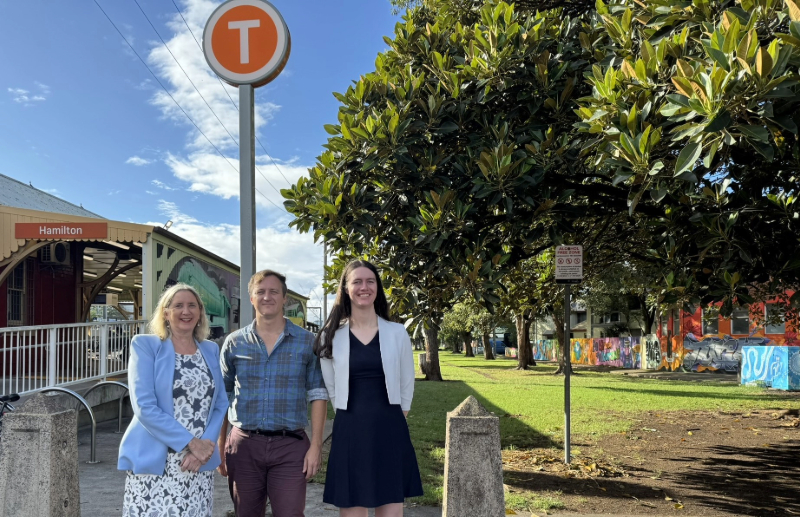City of Newcastle is asking the NSW Government to part fund a project worth up to $250,000 to help address anti-social behaviour on Beaumont Street.
The Community Building Partnership grant would deliver much-needed positive change to Hamilton Station Park with the proposed project featuring security and ambient lighting, upgraded utilities, as well as accessible seating and landscaping.
 Ward Two Councillors Jennie Barry, Joel Pringle and Paige Johnson at Hamilton Station Park.Lord Mayor Ross Kerridge said City of Newcastle has identified several elements that can be implemented to help create a more welcoming and supportive environment for all.
Ward Two Councillors Jennie Barry, Joel Pringle and Paige Johnson at Hamilton Station Park.Lord Mayor Ross Kerridge said City of Newcastle has identified several elements that can be implemented to help create a more welcoming and supportive environment for all.
“This is a complex site that requires a collaborative effort between multiple agencies to make sustainable and positive changes to how the park is used,” Cr Kerridge said.
“We want to revitalise the park and make it a safer one too, while at the same time providing economic benefit for local businesses through positive activation.”
The NSW Government’s $41.85 million Community Building Partnership program awards grants for community infrastructure projects that deliver positive social, environmental and recreational outcomes while also promoting community participation, inclusion and cohesion.
Executive Director Creative and Community Services Alissa Jones said the proposal has been developed utilising the principles of crime prevention through environmental design to make the park a safer and more welcoming community space.
“The State Member for Newcastle, Tim Crakanthorp, made us aware of the grant opportunity, informing me that it represented a great opportunity to improve Hamilton Station Park,” Ms Jones.
“City of Newcastle organised cross agency workshops, attended community meetings and conducted consultation with students, members of the public and business owners to develop the plan.”
Another element of the proposal would be a dual-sided noticeboard featuring information about events and local support services on one side and the local Aboriginal cultural story on the other.
The area is known as Ahwar-tah Bulboolba, which translates to ‘flat it is, Wallaby Place. A place of sand flats covered in tea tree scrub and an abundance of wildlife.’
“The local Aboriginal community will be involved in the park improvements, interpreting and displaying artwork and the Indigenous history of the area, contributing to feelings of pride and inclusion,” Ms Jones said.
Other elements of the project include the removal of the park’s perimeter fence to improve sight lines and deter anti-social behaviour, the installation of a water filling station, as well as electrical connections and a hard stand that can be used for pop-up events.
Ward Two Councillors have backed the Beaumont Street project as part of ongoing efforts to improve community safety and wellbeing.
“We know crime prevention through environmental design can be successful in Newcastle, as we have seen with the renewal of Islington Park, which was at one time experiencing similar social and safety issues,” Cr Jenny Barrie said.
“City of Newcastle started work on improving the space in 2023 with the Hamilton Station Park Graffiti Management project, which began to reduce the incidence of graffiti vandalism on the walls and improved the visual appearance of the area.
“If we can make the park an even more welcoming and supportive environment it can be enjoyed by residents and visitors, and become a venue for outreach support activities and community events.”
Councillor Joel Pringle said the project takes into consideration the retention of urban green space and amenity in the space.
“The proposed plan maintains existing vegetation and addresses root protection for the iconic fig trees,” Cr Pringle said.
“It’s great to see projects like this that enhance our community spaces for all to enjoy.”
The park’s free community pantry is proposed to be relocated to a well-lit location closer to Beaumont Street and upgraded with a purpose-built structure to provide better protection from rain and sunlight.
Councillor Paige Johnson noted the Hamilton Station Park proposal is part of the ongoing collaboration to deliver improvements for Hamilton.
“There has been a lot of positive conversations with stakeholders on infrastructure needs for the space which will continue as the design for the project progresses, to get the best outcome for our local community,” Cr Johnson said.
Should the NSW Government provide the maximum $100,000 grant to the project, City of Newcastle will contribute $150,000, bringing the total to $250,000.
Each State electorate is allocated $450,000 to award grants for community, infrastructure projects that deliver positive social, environmental and recreational outcomes.
Should the NSW Government commit less than the requested $100,000 grant funding then the project will require rescoping.

 Ward Two Councillors Jennie Barry, Joel Pringle and Paige Johnson at Hamilton Station Park.Lord Mayor Ross Kerridge said City of Newcastle has identified several elements that can be implemented to help create a more welcoming and supportive environment for all.
Ward Two Councillors Jennie Barry, Joel Pringle and Paige Johnson at Hamilton Station Park.Lord Mayor Ross Kerridge said City of Newcastle has identified several elements that can be implemented to help create a more welcoming and supportive environment for all.